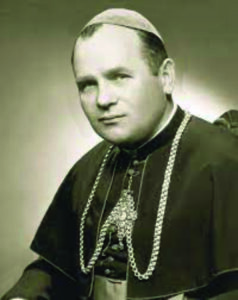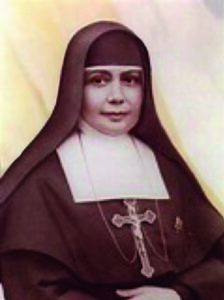July Saints
Blessed Vasil’ Hopko (1904-1976)
Vasil' Hopko was born on April 21, 1904, in Hrabské, a small village in Eastern Slovakia. Raised by his uncle, a Greek-Catholic priest, Hopko felt called to the priesthood at an early age. In 1929, he was ordained a priest at the Greek-Catholic Seminary of Presov. He went on to work with youth, elderly, unemployed and orphans in Prague. He founded both the Movement of Greek-Catholic Students and the Greek-Catholic Youth Union.
In 1936, Father Hopko returned to Slovakia where he served as spiritual leader in the Greek-Catholic Seminary of Presov. He was appointed as secretary of the Bishop's Curia, wrote various works, and became the first editor of the magazine Blahovistnik (The Gospel Messenger).
After World War II, the Czechoslovakian Communist Party intended to eliminate the Greek-Catholic Church so the bishop appointed Father Hopko as an auxiliary bishop to help defend against the attacks on the Greek-Catholics. On April 28, 1950, the Communists declared that the Greek-Catholic Church of Czechoslovakia no longer existed and that all its priests, followers and churches were to be transferred to the Orthodox Church. Bishop Hopko was arrested.
Bishop Hopko then underwent drastic interrogation and torture so he would deny his faith and confess to fabricated accusations. In 1951, after more than a year of cruel interrogation, he was condemned by the State Court to fifteen years in prison and a loss of all civil rights for ten years. While in prison, in addition to the torture, he was given small doses of arsenic which caused chronic poisoning. This was later verified by analysis of his bones.
In 1964, he was released from prison for health reasons, and renewed his efforts to resurrect the church community in the country. In the same year, Pope Paul VI confirmed Hopko as Auxiliary Bishop for all Greek-Catholic faithful in Czechoslovakia. He carried out this responsibility with great care, encouraging the faithful and ordaining priests.
Bishop Hopko died on 23 July 1976 in Presov, having made his own the words of one of his fellow Bishops: “For me, it is not important if I die in the Bishop’s Palace or in prison. What matters is entering into Paradise.”
Blessed Vasil’, obtain for us the grace to stand firm under criticism and persecution.
Source: Internet – various
Saint Nazaria Ignacia March Mesa (1889-1943)
Nazaria Ignacia March Mesa was born in 1889 in Madrid and was baptised in the local parish church of Saint Joseph where she later received her First Holy Communion. At age 7, she first heard the voice of Jesus Christ calling to her: "You, Nazaria – follow Me."
She was educated in Seville while living with her grandmother, and joined the Third Order of Saint Francis. The family later relocated to Mexico due to tough economic conditions and it was there that she joined the Little Sisters of the Abandoned Elderly on 12 July 1908. She was sent to Oruro in Bolivia and was there tending to the old and ill from 1908 until 1920. Nazaria assumed the habit on 9 December 1909, taking the religious name of Nazaria of Saint Teresa of Jesus. She made her solemn profession in 1915.
In 1924, Nazaria met Filippo Cortesi who discussed with her his desire to found a religious congregation dedicated to re-Christianising the world. She left her order on 16 June 1925 to found the new religious congregation and, with Cortesi’s approval, rallied ten Bolivian women to join her in this effort. The Missionaries of the Crusade were founded in 1926.
The first General Chapter for the order on 1 June 1930 saw the unanimous decision to elect her as the Superior General. Nazaria later embarked on a pilgrimage to Rome where she met Pope Pius XI in 1934 in a private audience. She told the pope that she wanted to die for the Church but Pius XI told her: "Do not die, but live and work for the Church." Mesa travelled to Madrid in 1935 where she founded a home for the spiritual exercises to be run, but left because of the dangerous and anti-religious Spanish Civil War.
She arrived in Buenos Aires in Argentina in 1938. Her poor health did not prevent her from taking part in the General Chapter held in Buenos Aires before her death. She started to suffer from pneumonia on 14 May 1943. Her condition worsened over the next two months and she died in July that year.
Saint Nazaria, help us to be open to the inspirations of the Lord in our lives.
Source: wikipedia


 Entries(RSS)
Entries(RSS)